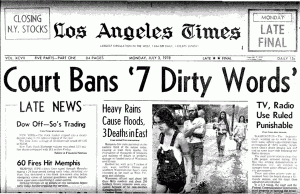Will it be 1978 all over again? That was the year the Supreme Court decided the seminal FCC v Pacifica case which legally established the constitutionality of the FCC’s ability to regulate indecent content in broadcast. But the media landscape of 2011 is very different than 1978. Today, network sitcoms airing as early as 8 PM regularly make unveiled jokes about sex and masturbation, while the bleeped out profanity in rock and rap songs on the radio seems almost laughable, since any 6th grader can easily fill in the blank of the four-letter-word that is missing. At the same time, broadcast competes with online media which is not regulated for indecency at all.
This is the context for the Supreme Court to weigh in on the ongoing legal challenge of the FCC’s current indecency regulations which have punished broadcasters for airing so-called “fleeting” indecency, when a single f-word has resulted in tens of thousands of dollars in fines.
Lower court rulings have already found that the FCC’s enforcement has been inconsistent. The 2nd Circuit noted that the Commission insufficiently explained why an unedited airing of the move Saving Private Ryan that contained indecent language did not merit the same fines as an awards broadcast where Cher said the f-word. That court also voided a fine against ABC for a scene with female nudity during the police drama NYPD Blue.
The FCC is said to be sitting on about 1 million indecency complaints while the challenge has been winding its way through the courts. However, this number is greatly inflated by the number of systematic letter-writing campaigns conducted by groups like the Parents Television Council, which asks members to complain about broadcasts that many or most haven’t even seen.
While the incidents sparking the court challenge all were on television, the indecency rules apply equally to radio. For broadcasters prohibitions against a few four-letter words are relatively easy to enforce when it comes to airing prerecorded music and syndicated programming. But things get hairy when it comes to live programs, whether it’s live news, artist interviews or call-ins.
Many stations that still air live programming have installed seven-second delays that give the operator an opportunity to dump a fleeting expletive before it goes on air. But such mechanisms are not full proof, and can also be a hindrance when callers or reporters on location are relying on an air feed to monitor what’s going on air. Simply put, if you hear yourself on the radio delayed by seven seconds, it gets hard to be coherent (that’s why callers are asked to turn off their radios).
Of particular frustration to broadcasters of all stripes is the fact that the FCC’s indecency rules have never been clear or outlined in a formal policy. Broadcasters have had to discern for themselves where to draw the line based upon previous Commission actions and commonly shared assumptions. Again, for the most common profanities this isn’t too hard, but it gets less clear when applied to descriptions of excretory or sexual functions that don’t include the s- or f-word. Most broadcasters who’ve tried to toe that line will probably tell you that the lack of clarity does serve as a kind of chilling effect. It’s particularly difficult for small broadcasters, both commercial and non-commercial, for whom a $35,000 fine could easily trigger insolvency.
In fining stations for fleeting expletives the FCC has claimed that certain words are in-and-of-themselves indecent without regard to context, such that the f-word immediately and unambiguously evokes its most offensive sexual context when uttered. Broadcasters argue otherwise, noting that the context of fleeting expletives is important in judging indecency, noting that most of the time the words are not intended to refer at all to sexual or excretory function.
Certainly many free speech advocates are hoping the Supremes will end the FCC’s ability to regulate indecent speech. I happen to think that outcome is unlikely, even in the shadow of the recent decision striking down the regulation of violent video games. However, I do expect the Court will force a clearer explanation of indecency prohibitions, updated to match the media landscape that exists 33 years after justices heard George Carlin’s seven dirty words.
The Court will likely take up the case in the fall.



